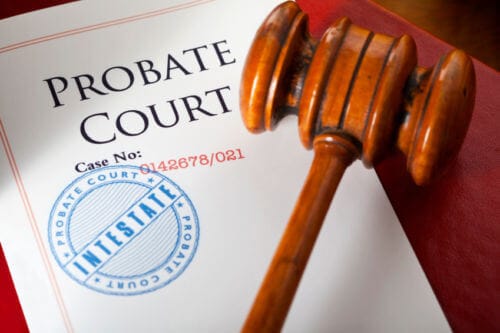Understanding The Probate Process
April 21, 2011
By: J. Cale Rogers
Coleman, Chambers & Rogers, LLP
This article is intended for educational purposes only and is not intended, nor should be construed to provide legal advice.

Though some probate lawyers and internet sources suggest that probate is a difficult and expensive process and should be avoided if possible, those are misconceptions that oftentimes prove to be inaccurate. The probate process is relatively simple, assuming there is no challenge to the validity of the will. First, the original Will is filed with the probate court in the county where the decedent was living when he died. The Will must be accompanied by an original death certificate and a petition to probate the Will that identifies, among other things, the heirs of the decedent (the individuals who would have inherited from the decedent had the decedent died without a Will). Once the probate petition is filed, the Georgia Probate Courts will cause all of the decedent’s heirs to be served with a copy of the petition and the Will. In some instances, it is possible to have the heirs acknowledge service of the Will without being formally served by signing a formal acknowledgement that is filed with the Court. Once each heir is properly served, if they do not object within a certain period of time (generally 10 days), the executor becomes eligible to take an oath before the Probate Judge to be sworn in as executor of the estate. Once the executor takes the oath and is qualified by the Probate Judge, the Probate Court issues Letters Testamentary (an official order of the Court) that vest the executor with the powers and privileges of an executor under Georgia law necessary to administer the estate.
Unless the Will provides otherwise, an executor is generally required to post a bond equal to the value of the probate assets (generally excluding real estate) prior to taking an oath. Additionally, unless the Will provides otherwise, an executor is required to file an inventory of the assets of the estate and annual returns summarizing the annual distributions and income of the estate. Regardless of whether the executor is relieved of these duties under the terms of the Will, an executor is required to account to any beneficiary of the estate in writing, at the request of the beneficiary, no less than annually.
The primary purpose of probate is to clear title to assets vested in the estate, so that they may be distributed to the relevant beneficiaries, and to provide the requisite notice to creditors of the decedent of where the estate is pending and who has qualified as representative of the estate. Generally, the claims of creditors against the estate take priority over claims of the beneficiaries named in a Will. Not all debts of a decedent are treated equally. Georgia law has adopted a statute concerning the priority of debts, whereby those debts with a higher priority are paid before others. Once an executor has been qualified by the Probate Court, he is required to run a notice to creditors in the local newspaper, as a portion of the probate process. Once the period for creditors to file claims runs, if no claims have been filed, an executor can make distributions to beneficiaries without fear of liability.
The administrator of an estate often requires the executor to open a bank account in the name of the estate. Financial institutions generally require Letters Testamentary and a Federal Tax I.D. Number to open the account. The administration process sometimes requires the assistance of an lawyer to transfer real property, stocks and other assets of the estate. To the extent that the estate is vested with any sort of retirement assets or to the extent that the Will contains a trust, it is always advisable to seek the advice of an experienced probate lawyer to gain direction and insight concerning the procedures employed under those circumstances.
An executor should be aware of the fact that he is not required to personally bear the expense of probating an estate. Generally, costs associated with the administration of an estate paid by an executor are afforded a higher priority under Georgia law than other claims and are generally reimbursable to the executor once the administration process begins. Also, an executor should know that Georgia law provides that an executor is entitled to a commission for acting as executor of a Last Will & Testament, the same being equal to approximately 5% of the distributions from the estate. (The purpose of this article is not to discuss in detail the commission that an executor is entitled to under Georgia law). An executor is also entitled to a percentage of interest earned by estate assets.
The administration of an interstate estate (an estate for someone who dies without a Will) is similar to that set forth in this article. A relative of the decedent must file a probate petition for letters of administration (accompanied by a death certificate) with the Probate Court identifying the heirs of the decedent. The heirs are served with the petition and are given an opportunity to object if they chose to do so. If an objection is filed, the Court will hold a hearing. If no objection is filed within the relevant time frame (typically 30 days), the Court will issue Letters of Administration to the applicant, after he takes an oath, and he will be authorized to act on behalf of the estate with many of the same powers delegated to an executor under Georgia law.
The probate process is generally inexpensive, as long as the relevant petition is not contested. Call a probate lawyer with Coleman, Chambers & Rogers, LLP to discuss questions you have concerning filing a petition to probate a Will. We appear regularly in Probate Courts in Gainesville, Dahlonega, Cumming, Dawsonville, Cleveland, Clarksville and Lawrenceville. In many instances, we can obtain Letters Testamentary for clients in just a few short weeks.
About the author: Cale Rogers is a partner and lawyer with Coleman, Chambers & Rogers, LLP, in Gainesville, Georgia. The law firm regularly handles matters in Probate Court in almost all North Georgia counties including: Hall County (Gainesville), Dawson County (Dawsonville), White County, Forsyth County (Cumming), Lumpkin County (Dahlonega), Union County, Habersham County (Cornelia, Clarkesville, Baldwin), Towns County (Hiawassee), Stephens County (Toccoa), Rabun County (Clayton), Banks County (Homer), Fulton County (Atlanta), Gwinnett (Lawrenceville, Buford) and Jackson County (Jefferson). Please call the family law lawyers at Coleman, Chambers & Rogers, LLP to discuss your options. Please call 678-601-2495 .
















